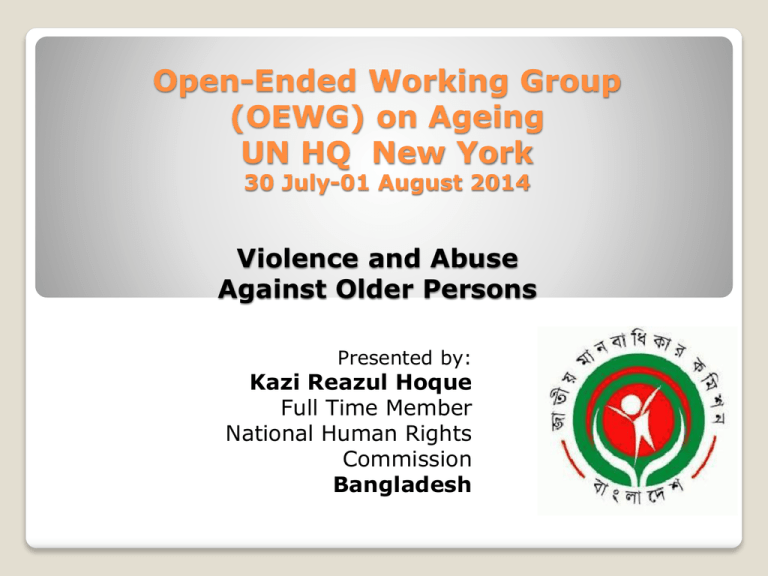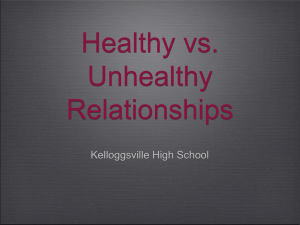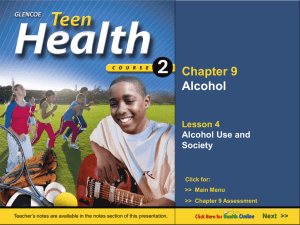
Open-Ended Working Group
(OEWG) on Ageing
UN HQ New York
30 July-01 August 2014
Violence and Abuse
Against Older Persons
Presented by:
Kazi Reazul Hoque
Full Time Member
National Human Rights
Commission
Bangladesh
A Big thank!!
Thanks to the UN initiatives for the Promotion and protection
of the human rights and dignity of older persons
I also appreciate the role of APF and NHRI for
monitoring the Human Rights of older persons.
Constitutional Obligation: Protection of
Older Persons from Violence and abuse.
As per Bangladesh constitution, the needy
elderly people has a right to social
security. This is one of the fundamental
principles of state policy (article 15d) and
fundamental rights (article 26-47A)
Older Person demography in
Bangladesh
The total elderly population is more than
12 million
Nearly 8% of the total population are
elderly
Projected number of older population in
2050 is 20% of the total population
(that is, 1 in every 5 persons will be older person)
Some Ageing Statistics
Year
Bangladesh
1950
1.8 million
1975
4.0 million
2000
8.0 million
2010
10 million
2025
11.8 million
2050
43.0 million
Every year 85 thousand Bangladeshi are being older
Now In BD 12: 1 OP; 2050 year 5 :1 older person
Type of Violence/ Abuse
Abuse is widespread than violence in
Bangladeshi Community
Abuse
Indoor Abuse
Property Abuse
Financial abuse
Abuse through Media
Many rules and regulations are not older
person friendly
• Older
persons are used in alms-giving
(Begging) in BD which is a social evil
• Poor condition of inheritance and succession
•
•
•
•
•
Type of Violence/ Abuse
Violence
In Family
In Disaster (neglect in rescue)
Relief and rehabilitation
Minority Groups (Sex workers, Indigenous
Community..etc.)
•Hard Core Poor
•
•
•
•
Some information on abuse
Elderly necessity is often
ignored
2. Older Persons don’t get
priority in healthcare
system
3. Socially they are
marginalized
4. Many of them are physically
abused
5. Disrespect to Elderly Rights
is widespread
1.
A Research Findings
A recent PhD thesis of Dhaka University
shows that 50% of the respondents agree
that they are neglected and abused from
the family and the society in Bangladesh.
•
18.33% respondents mentioned that they
use to face mental and physical torture.
•
A significant section of older persons did
not response the question which depicts
that the actual number will be much more
higher.
•
A recent Study on Abuse
Elder Abuse and Neglect: Evidence from Bangladeshi
Older Women.
by
•Masud Ibn Rahman. Bangladesh Journal of Geriatrics.
Vol 48 October 2013 PP 101-111.
Findings:
•A
significant number of older women face neglect and abuse
in Bangladeshi society.
•Psychological
abuse is higher than other type of abuse and it
exists in diverse form in the society.
•There
exist a significant association between the economic
status and the negligence or discrimination situation of older
women in Bangladesh.
Research outcome of GGW Program, Institute of Social Welfare and
Research(ISWR), Dhaka University.
Poverty- A key Issue of Violence and Abuse
•Total
population of Bangladesh 160 million.
•30%
of the total population are believed to live below the
poverty line.
•Nearly
8 % (12 million) of the total population are older
The poverty of Older Persons is much higher than other
age groups.
85% people live in rural areas. The rural older person
have massive poverty.
•
Initiatives: Government
1. Old Age Allowance Program
As many as 2.75 million beneficiaries received this
allowance at a monthly rate of Tk. 400.
Administered by the Ministry of Social Welfare,
this programme received an allocation of Tk. 8910
million in FY 2010-11.
2. Retirement Benefits
Leave Preparatory to Retirement (LPR)
Gratuity, Family Pension
Government Accommodation
Benevolent Fund, Group Insurance
General Provident fund (GPF)
3. Honorarium Programme for Insolvent Freedom
Fighters
4. State Honorarium to the Disabled Freedom
Fighters
5. Allowance Programme for Widowed, Deserted
and Destitute Women
Other Ongoing Programmes under the
Social Safety-Net
Food for Works Programme (FFW)
Vulnerable Group Feeding (VGF) Programme
Vulnerable Group Development (VGD) Programme
Employment Generation Program for the Ultra-Poor
Ashrayan (Poverty Alleviation and Rehabilitation) Project
Ekti Bari Ekti Khamar (One House, One Farm)
Fund for Housing the Homeless (Grihayan Tahabil)
Poverty Eradication and Ensuring Livelihood for the People
Living in Economically Backward Areas
Economic Empowerment of the Poorest in Bangladesh (EEP)
Project
Initiatives other than the government
Bangladesh Association for the Aged and Institute of
Geriatric Medicine (Oldest NGO)
HelpAge International (INGO)
Elder and Child Rehabilitation Centre (Philanthropist)
Bangladesh Women’s Health Coalition (BWHC)
Resource Integration Centre (RIC) (microcredit)
Sir William Beveridge Foundation (home care)
Bangladesh Retired Government Employers Welfare
Association
Institute of social Welfare and Research (Academia)
Bangladesh Gerontological Association (Professional group)
Ageing Support Forum (bridging generations)
National Human Rights Commission (NHRC)
•NHRC
Working in collaboration with GO, NGOs,
Philanthropists and Social Workers of Bangladesh
to uplift the Human Rights of Older Persons.
Cause of Violence/ Abuse
1.
Poverty, landlessness, change of values
and norms, urbanization and migration ,
materialistic thoughts, consumerism,
nuclear family.
2.
Poor financial condition of Older persons
3.
Social Safety net is weak
4.
Rural population are mostly poverty
striken.
Women: Looser in every aspect & victims of
Social Injustice
Feminization of Ageing:
•More women survive into late life
compared to men.
•More than two-thirds of the world’s
oldest (85+) population are women
•The risk of chronic disease such as joint
pain, high blood pressure, diabetes, and
heart diseases is higher among older
women
• Older Women are the prime victim of
neglect and abuse
Elderly Women in BAAIGM, the
oldest NGO for older persons
Challenges and way forward
Challenges:
• Resource constraints in Physical & Medicare
• Limited access to employment
• Accommodation problems & socio-cultural
neglect
• Lack of access to Rights & decision making in
the family and community
• Lack of participation in civil, political and sociocultural rights
• Isolation & loneliness
Way forward
•
Formulation of policies and legislations at
domestic and international level
•
Strengthening Monitoring of the Care
Giving System
•
National Mechanism for monitoring and
care
•
mechanism for organizational and
institutional level for care giving and
monitoring
Developing home care giving facility in
societal level
•
Ensuring legal financial and social
support
A home caregiver of SWBF in
Dhanmondi area of Dhaka City)
Some Recommendations
Uplifting the Human Rights
as well as Elderly Rights
2. Listening
to them with
respect
3. Giving priority to the elderly
necessity
4. Not to neglect or abuse
5. Stand
against
elderly
violence
6. Inclusion of Older Person to
the decision making process
7. Ensuring participation in civil
political and socio-cultural
arena.
1.
Compliance by the stakeholders
Implementation of the National Ageing Policy 2013
Implementation of the Parents Maintenance Act 2013
Religious obligation and cultural heritage
Positive role of the Media
Inclusion of Old Age issue in the academic course
curriculum
Strengthening Elderly Welfare programs from both
Government and Non-government level
Ensuring Dower Money and Inheritance Wealth from
the state.








